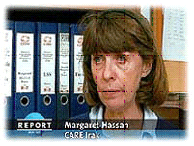 If it is possible to parse horror from horror in the hell of our war in Iraq, Margaret Hassan’s murder stands apart.
If it is possible to parse horror from horror in the hell of our war in Iraq, Margaret Hassan’s murder stands apart.
Not because she was a woman, and not because she was a Western woman (she was born Irish), but because Margaret Hassan’s sole purpose as head of CARE International’s operations in Iraq was to help. Not to fight, nor simply to exist, but to help.
While finding meaning in her death is hard, the facts are stark and blunt. On November 16, after a month held captive by unidentified militants, and despite pleas from her Iraqi husband for her release, Hassan, blind-folded and a camera rolling, was executed with a bullet to the head. Her body has yet to be recovered.
What a heinous fate: A person who dedicated 30 of her 59 years relieving suffering in Iraq, subjected to unimaginable suffering herself, then cut down. A woman whose special mission was Iraq’s children, “a lost generation” as she termed them, herself lost.
Of the outrage and grief expressed worldwide, that of the head of a clinic in Baghdad, an Iraqi man who worked with her, pays eloquent tribute—and points to meaning. Noting to The Jordan Times that Hassan “understood the suffering of the Iraqi people” and that her loss was a huge blow to all Iraqis, he added simply: “We need to admire and remember her.”
Indeed, this impromptu eulogy states it well. We need to admire and remember the purpose Margaret Hassan embodied and died for: caring.
Sadly, caring of the hands-on kind in Iraq, because of the chaos, now has fewer hands. CARE International, the world’s largest humanitarian relief agency, ceased all operations in the country when Hassan was captured; earlier, Doctors Without Borders had pulled out.
And caring of another kind—dare I call it the beating heart of the world?—also falters.
If the suffering in Iraq were not sorrow enough, we see the masses of starving refugees in Sudan’s Darfur region, whose women, to compound the outrage, are raped and tortured.
But, remembering Hassan’s example, we must care.
And, as her colleague said: We need to admire it. Especially we Americans. Because, let’s be honest, too often in our culture helping is devalued, even derided. Once the province of heroes, somehow the act of doing good has lost standing.
Proof? To be a “do-gooder” is not praise but put-down, mocked all the more when framed in quote marks.
This shift occurred with us boomers (perhaps we’re a “lost” generation”?). The shock of 9/11 might have sorted out our character, but three years on we see instead the apotheosis of the sharp elbow and a deflating “cool.”
Yes, we retain high levels of volunteerism and the administration professes a “compassionate conservatism.” But despite the touting of “moral values” in the recent election, our emblematic figures are “desperate housewives” and Donald Trump’s apprentices.
How utterly at odds with the skills and sheer fortitude it takes to do good, especially in very bad times. Margaret Hassan showed us how.
Described by her friends as having “a spine of steel,” she stayed on in Iraq and ministered through the 1991 Gulf War, the harsh years of the embargo, and the “shock and awe” of our invasion, which she forcefully protested and whose dark forces she assuredly anticipated.
May the death of this good woman banish forever any mockery directed at the “do-gooder.” And may we admire that figure, revealed in death as towering and magnificent.
Dear Margaret Hassan: Rest finally in peace.
Carla Seaquist of Gig Harbor is author of the play “The Washington-Sarajevo Talks” and is working on a new play, “Prodigal.”
